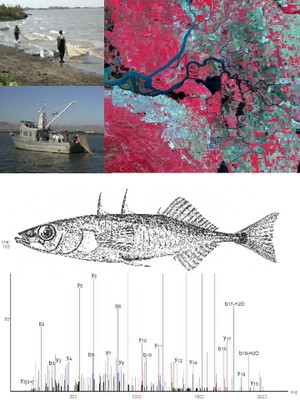May 12th, 2014
 The Delta Science Program and the UC Davis Center for Aquatic Biology and Aquaculture (CABA) are pleased to present a Science Synthesis Seminar.
The Delta Science Program and the UC Davis Center for Aquatic Biology and Aquaculture (CABA) are pleased to present a Science Synthesis Seminar.
Web cast of this seminar can be found here... http://webcast.ucdavis.edu/llnd/60bab152
OVERVIEW:
The San Francisco Bay Delta system represents one of the most ecologically and economically diverse and important ecosystems in the world. It has been the focus of significant research and monitoring efforts for a long time and represents a well-studied system with many activities taking place to preserve its ecological health while maximizing its economic value. This symposium will present novel high-throughput analytical approaches, technologies, and workflows that support broader and more in-depth characterization of environmental conditions on Bay-Delta organisms than previously possible. In particular, modern approaches for high-throughput molecular phenotyping (e.g. proteomics), population genomics, and physiological phenotyping will be presented. In addition, the seminar will explore how these approaches can be linked to and integrated with ongoing high-throughput environmental monitoring programs and biological surveys of Bay-Delta organisms. A panel discussion will explore ways of finding better linkages in this regard and inform participants about needs and opportunities for leveraging the full potential of modern high-throughput analytical technologies. Such integration will enable us to much more comprehensively assess how specific changes in the environment affect Bay-Delta organisms and inform sustainable management practices.
Program:
9:00 - 9:15 - Welcome and Introduction - Dr. Peter Goodwin Lead Scientist Delta Science Program
and Dr. Dietmar Kueltz – UC Davis Animal Science
9:15 – 9:35 - The state of aquatic organisms in the SF Bay Delta ecosystem: an overview
Dr. Peter Moyle - UC Davis
http://wfcb.ucdavis.edu/www/Faculty/Peter/petermoyle/Introduction.html
9:35 – 10:15 - Existing fish survey and monitoring programs – What are we looking for, how and why?
Dr. Ted Sommer - California Department of Water Resources
http://www.water.ca.gov/aes/staff/sommer.cfm
10:15 – 10:35 - Break
10:55 – 11:15 - Continuous biogeochemical data – Developing the baseline to support existing and emerging biological assessments
Dr. Brian Bergamaschi - US Geological Survey
http://profile.usgs.gov/bbergama
11:15 – 11:55 - Modern ecophysiological approaches to studying the biological state of SF Bay Delta organisms
Dr. Nann Fangue - UC Davis
11:55 – 1:10 - Lunch break
1:10 – 1:45 - Integrating data rich techniques in process based models – Green Sturgeon
Dr. Pedro Vaz - UC Davis Animal Science
1:45 - 2:25 Real-time management of fishes in the watershed with acoustic array.
Dr. Peter Klimley - UC Davis
http://wfcb.ucdavis.edu/www/faculty/Pete/index.asp
2:25 – 3:05 - High-throughput proteomics approaches for assessing environmental impacts on SF Bay Delta organisms
Dr. Dietmar Kueltz - UC Davis
3:05 - 3:20 - Break
3:20 – 4:00 – Genomics approaches to studying SF Bay Delta organisms
Dr. Mike Miller - UC Davis
https://sites.google.com/site/millermichaelryan/
4:00 – 4:50 - Panel Discussion: Opportunities and Barriers – How to leverage and integrate emerging environmental monitoring techniques with existing monitoring programs.
Panelists: Matt Nobriga (USFWS), Ted Sommer (CA DWR), Steve Slater (CA DFW), Swee Teh (UCD), Jim Hobbs (UC Davis), Dietmar Kueltz (UC Davis), Nann Fangue (UC Davis), Mike Miller (UC Davis)
4:50 – 5:00 - Closing Remarks - Dietmar Kueltz - UC Davis Animal Science
This is a free public event.
For more information contact – Garrett Liles –Delta Science Program garrett.liles@deltacouncil.ca.gov – (916) 445-5694